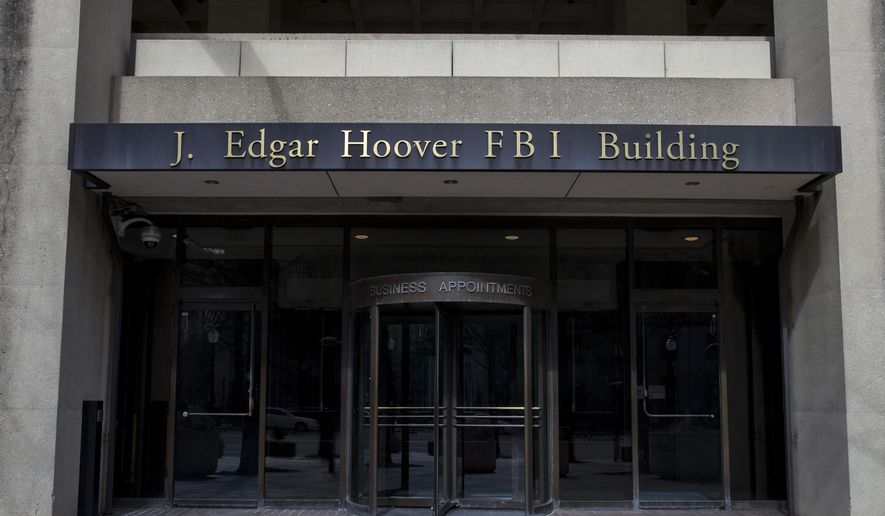Former FBI top lawyer James Baker said Wednesday he still has confidence in the secret warrant the bureau obtained in 2016 to conduct surveillance on Trump campaign adviser Carter Page.
Mr. Baker, in an interview with Yahoo’s “Skullduggery” podcast, says the warrant holds up today even though questions have been raised about its use of information from former British spy Christopher Steele and his largely discredited anti-Trump dossier.
“When I read that Carter Page application, to me, even just going on what’s not been redacted, at the end of the day, I thought that what was in there was consistent with the way we describe sources and describe their reliability in other applications,” said Mr. Baker, who was involved with the warrant at the time it was obtained and renewed.
The Page warrant is the subject of three separate investigations at the Justice Department. Two different U.S. attorneys are engaged in probes, and Inspector General Michael Horowitz is expected to release his own findings on the matter within weeks.
Mr. Baker earlier this week said he’s bracing for Mr. Horowitz to say the bureau bungled some things.
“The inspector general is looking at everything we did,” he told CNN. “The IG usually finds that mistakes were made, so I expect him to find mistakes this time.”
Mr. Baker said he would cooperate with U.S. Attorney John Durham, who was revealed this week to be conducting a new probe at the behest of Attorney General William Barr.
The former FBI lawyer said he thinks what the bureau did is defensible.
“I welcome scrutiny,” he said. “I plan to fully cooperate with the department to help them figure out what happened. Because I believe what happened was lawful, at least based on every piece of information that I have.”
Republican critics say they can’t see how that’s possible, given that Mr. Steele’s work was paid for by Hillary Clinton’s campaign and the Democratic National Committee, and explicitly relied on Russian sources who may have been engaging in disinformation.
In his dossier Mr. Steele accused Mr. Page of multiple felonies, saying Mr. Page worked as a liaison with the Kremlin to facilitate Russian meddling in the 2016 election and agreed to a bribe in exchange to lifting U.S. economic sanctions.
Mr. Page has maintained his innocence and was exonerated by special counsel Robert Mueller.
Mr. Page declined to comment Wednesday when contacted by The Washington Times.
The dossier’s information was used by the FBI to obtain a warrant under the Foreign Intelligence Surveillance Act.
Mr. Baker maintains the bureau did the necessary legwork to verify the dossier’s accusations before wiretapping Mr. Page.
“We are not a bunch of idiots and we just don’t take everything and swallow it hook, line and sinker,” he said. “We go through a process of validating information that we receive from sources. It’s hard. It’s challenging.”
Mr. Baker said the bureau issued a disclaimer about the dossier in a lengthy footnote in the FISA warrant application, which he said should have satisfied the court.
The footnote explains that Mr. Steele was “likely” hired to conduct research that could be used to discredit Mr. Trump’s campaign. But it also describes Mr. Steele as “reliable,” adding that the bureau found his reporting credible.
Mr. Baker said if the FBI did not believe the dossier’s accusations, it would not have used it to bolster the FISA application.
“A lot of that footnote is blacked out, but I think it does make an assessment at the end of the day that the FBI believed him to be reliable,” he said. “You can imagine some type of scenario where you would put the information in and say you don’t believe its reliable, but I think we would most likely not even put it in there in the first place if we didn’t think it was reliable.”
When asked whether he would do anything different in the Page case, Mr. Baker hedged.
He said, generally, FISA cases can change and evolve, making them easy to second guess after the fact.
“I don’t know what I would do,” he said. “You have to remember that a FISA application is part of an investigation. In order to get authorization to use that particular type of investigative tool to figure out what is going on. It’s a snapshot taken of a particular moment of an investigation when you know certain facts, but you don’t know everything.”
• Jeff Mordock can be reached at jmordock@washingtontimes.com.




Please read our comment policy before commenting.